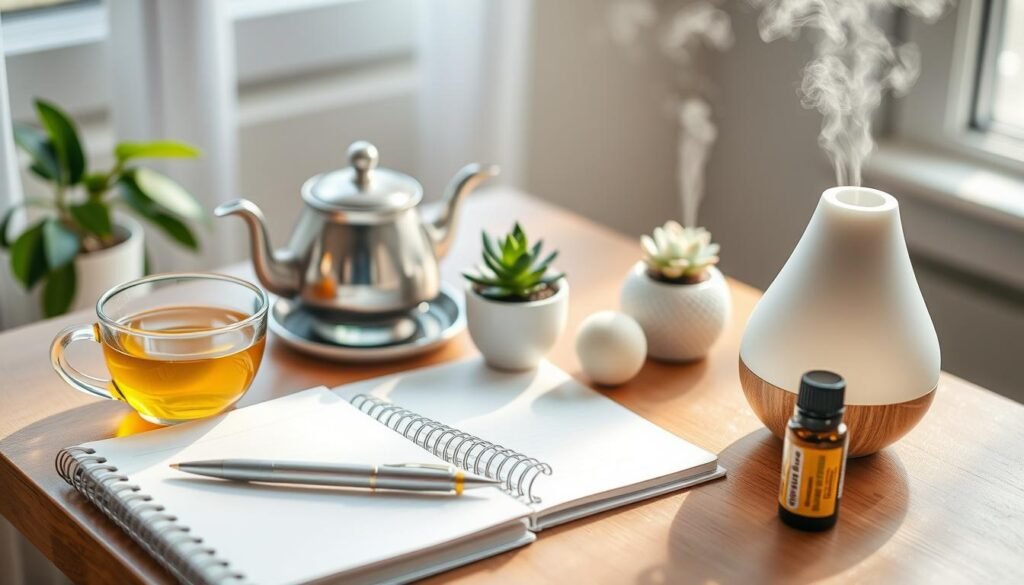About 31.1% of U.S. adults will face an anxiety disorder at some point. This shows a big need for good anxiety tools. For those with mild-to-moderate anxiety, finding ways to handle it is important. They often feel uneasy for weeks or more. This article is a full guide to help them. It covers identifying symptoms, understanding causes, and managing anxiety.
Anxiety is complex, involving mind, self-view, and even genetics. This guide helps you see the big picture. It talks about how certain thinking patterns, like seeing only extremes, can make anxiety worse. It also shows how to fight these thoughts. Getting support from loved ones is also key to getting better.
Key Takeaways
- Anxiety affects over 31% of U.S. adults, emphasizing the need for effective management strategies.
- Understanding symptoms and causes helps in recognizing and addressing anxiety issues.
- Challenging unhelpful thoughts is vital in managing anxiety effectively.
- Emotional support from friends and family plays a crucial role in coping with anxiety.
- Utilizing stress assessments can pinpoint individual’s anxiety levels for better management.
Introduction to Anxiety and Its Effects
Anxiety is common and filled with worry and fear. An anxiety overview shows it changes how we think, feel, and act. It can make everyday challenges tough, leading to mental health issues.
Anxiety affects us in many ways, hurting our well-being. It comes in forms like social anxiety, panic disorder, and more. Each has its own struggles, making it crucial to manage anxiety well.
It’s important to know about anxiety to support mental health. There are tools and resources for help. For example, certain books offer self-help tips for fear or general anxiety.
For those dealing with social fears, programs like “Stepping Out of Social Anxiety” are great. They provide specific ways to overcome such challenges.
Learning about treatments like cognitive-behavioral therapy is useful. These methods help tackle harmful thoughts. They improve mental health significantly. For more, check out this resource on anxiety disorders.
Understanding Anxiety Symptoms
Knowing how to spot anxiety is key to dealing with it well. People might feel physical sensations of anxiety along with emotional trouble. This shows they are really stressed. Often, folks worry too much about daily things like health, money, or friends. This fear can make everyday tasks hard.
Panic attacks are extreme fear bouts that come on fast. They can cause a racing heart, sweat, and a sense of doom. Even though these attacks don’t last long, they can lead to lasting worry. Also, health fears can make someone always worried about being sick. This leads them to look for reassurance all the time, yet never feeling sure.
Each anxiety disorder has its own symptoms. For example:
| Disorder | Common Symptoms |
|---|---|
| Generalized Anxiety Disorder (GAD) | Excessive, uncontrollable worry |
| Social Anxiety Disorder | Fear of negative evaluation by others |
| Obsessive-Compulsive Disorder (OCD) | Intrusive thoughts paired with compulsive actions |
| Post-Traumatic Stress Disorder (PTSD) | Vivid memories of a traumatic event |
| Specific Phobia | Irrational fear of specific objects or situations |
Many also feel restless or easy to upset. They may have physical sensations of anxiety like a fast heartbeat, trouble breathing, and tiredness. Knowing these diagnostic criteria is important. It can help figure out personal symptoms that need a doctor’s help.
When anxiety appears with ADHD, it can make finding and treating it harder. Things like stress, how we live, and our genes can make anxiety worse. If anxiety feels too big, spotting its signs can be the beginning of getting help that matters.
What Causes Anxiety?
Anxiety springs from various causes. Different anxiety causes are shaped by personal experiences and natural tendencies. Knowing why anxiety happens helps us manage it better.
Environmental factors are really important. Life’s tough spots like losing a job, relationship problems, or big changes in society can start anxiety symptoms. For kids, being bullied or big family changes can lead to anxiety disorders when they grow up.
Biological influences also matter a lot. Our genes might make us more likely to have anxiety, showing it can run in families. Studies show that our brain chemistry plays a role too. It affects how we handle our feelings.
Psychological triggers are crucial to consider. The way we think, especially if we lean towards negative thoughts, can make anxiety worse. Traumatic events or too much stress can push us towards anxiety disorders, changing the way we see the world.
Knowing about environmental, biological, and psychological aspects helps us understand anxiety better. This knowledge lets us face anxiety head-on and work on ways to handle it.
Essential Anxiety Tools for Daily Management
Navigating through life with anxiety is tough. Using effective tools for anxiety management can really help. Mindfulness and breathing exercises are key. They give you great ways to find peace and build strength. Let’s dive into these tools that fit into your daily life.
Mindfulness Techniques
Mindfulness means paying attention to now. Practices like meditation and body scans lessen worry. Doing these often brings a sense of peace and better mental health. Adding mindfulness to your daily routine makes a dependable way to handle anxiety.
Breathing Exercises
Breathing exercises are vital for easing anxiety’s physical signs. Techniques like deep breathing slow your heartbeat and relax you by releasing feel-good chemicals. Spending a few minutes daily on these exercises boosts your emotional state. Adding these breathing methods to your routine is a great way to manage anxiety.

Strengthening Social Connections
Having strong social ties is key to better mental health. This is especially true for people dealing with anxiety or depression. Support from friends and family creates a feeling of belonging. This can reduce the feeling of being alone. Studies back up the importance of close relationships. They prove that good social ties can greatly enhance a person’s happiness.
Benefits of Emotional Support
A study shows 71 percent seek support from loved ones when stressed. This highlights how crucial social bonds are. People with strong support networks feel less stress. They also cope better physically with life’s hurdles. Loneliness, on the other hand, increases health risks. This includes heart disease and mental decline. It stresses the need for maintaining solid friendships. Good friends build a network that helps us during hard times. Positive emotion programs boost how socially active we are. This leads to more support and happiness.
How to Nurture Relationships
Building social connections requires real effort. Here are tips to strengthen those bonds:
- Spend time in person. It’s more emotionally fulfilling than texts or calls.
- Listen well and discuss fears and insecurities. It strengthens trust.
- Physical touch, like hugs, can comfort us and bring us closer.
- Keep a positive outlook. Do things that make both of you happy. It strengthens joy from friendships.
- Steer clear of harmful relationships. Cherish those who make you feel good.
Actively engaging with others boosts our mental wellbeing. It might even help us live longer, healthier lives. Close bonds offer emotional support. They shield us from day-to-day stress.
Physical Activity and Mental Wellness
Being active is great for your mental health. Working out can boost your mood and help you feel less anxious. Knowing which exercises are good for your mind makes staying healthy fun.
Types of Exercises to Boost Mood
Many exercises can make you happier and healthier. Here are some good choices:
- Aerobic Workouts: Fast walking, running, or biking can make your heart race and uplift your mood.
- Strength Training: Lifting weights can make you feel stronger and less anxious.
- Yoga: Yoga combines moving your body and being aware, helping you relax both physically and mentally.
- Dance: Dancing is a fun way to connect with others and express your feelings.
The Impact of Regular Activity on Anxiety
Staying active can really lower your stress. People who exercise are less anxious than those who don’t. Experts say to aim for 150 minutes of heart-pumping activity each week. Even short walks can make a big difference.
Amazingly, a quick 10-minute walk can calm you as much as a long gym session. This shows that getting moving is easy for those looking to reduce stress. Also, working out with others can make you feel better and supported.

Feeling stressed? Try an anxiety quiz to see where you stand. A routine filled with physical activity builds confidence and helps you handle stress better.
| Type of Physical Activity | Recommended Duration | Benefits |
|---|---|---|
| Aerobic Workouts | 150 minutes/week | Improved mood and anxiety relief |
| Strength Training | Varies | Boosts self-esteem and reduces anxiety |
| Yoga | Varies | Mindfulness benefits and relaxation |
| Walking | 10-15 minutes/day | Accessible anxiety relief |
| Group Activities (e.g. classes, team sports) | Varies | Enhances social connections and mood |
Learning New Skills for Confidence Building
Picking up new skills is key to building confidence and boosting self-esteem. Participating in skills development brings a sense of achievement that fights anxiety. For example, playing a new instrument or cooking can be fun and help you grow.
Studies show lifelong learning strengthens mental toughness. A 2015 study found self-compassion and confidence go hand-in-hand. When we improve our skills, we feel more capable during tough times. It’s also crucial to stop negative self-talk to become more positive and believe in ourselves more.
During the pandemic, many turned to new hobbies for comfort, making the best of their situation. Activities like gardening or learning a new language gave them purpose. Dennis Buttimer mentions that learning new skills not only helps us but those around us too, through our new talents.
Adding learning to our daily lives boosts our brain and mood. Using videos, classes, or podcasts to learn new things works well. Topics can range from meditation to graphic design. Remember, being kind to yourself when you hit a bump helps keep you going.
Trying new things gives us purpose. And getting better at them makes life more fulfilling. This shows how learning and happiness are connected. For tips on gaining confidence and facing fears, check out this link.
| Skill Type | Benefits | Suggested Activities |
|---|---|---|
| Creative Skills | Enhances self-expression and reduces stress | Music, Art, Writing |
| Cognitive Skills | Improves problem-solving and critical thinking | Languages, Coding, Mathematics |
| Physical Skills | Boosts body image and emotional health | Yoga, Dance, Sports |
| Practical Skills | Encourages independence and resourcefulness | Culinary, Gardening, DIY Projects |
Giving Back: The Importance of Kindness
Being kind helps improve mental well-being. Volunteering and helping out can reduce stress and boost happiness. Through small actions, we can make big connections and feel better about ourselves.
Little kindnesses, like checking in on friends or helping a neighbor, keep communities strong. These gestures don’t take much time or money. But they make a big difference. Some examples are:
- Sending letters to grandparents
- Offering to babysit for a friend
- Hosting get-togethers for neighbors
- Sending motivational texts to those in need
- Engaging in volunteer work
Studies show kindness makes our brains happy and fulfilled. Those who give back have less stress and anxiety. This shows how important kindness is for mental health.
Charities bring people together through events. This gives us a chance to help out and feel part of a community. Seeing the good in what we do boosts our mood and keeps us kind.

The Mental Health Foundation invites us to share kindness stories online. This builds a thankful and supportive community. Doing good lifts our spirits. It shows how volunteering is key to feeling worthy and connected.
| Type of Kindness | Impact on Mental Well-Being |
|---|---|
| Helping Neighbors | Strengthens community ties |
| Volunteering | Reduces anxiety and fosters fulfillment |
| Random Acts of Kindness | Improves emotional health |
| Financial Support | Provides satisfaction and purpose |
Giving back creates a cycle of kindness. It boosts our well-being and makes society healthier and more caring.
Maintaining Mindfulness for Present Awareness
Bringing mindfulness into your day makes your mind clearer and less anxious. Mindfulness is great because it fits into any lifestyle. With easy methods, you can become more aware and calm every day.
Techniques to Incorporate Mindfulness Daily
Using mindfulness techniques every day helps you connect more with now. Here are a few good ways:
- Meditation: Spending a bit of time meditating each day improves your focus. It lowers stress and is good for your emotions.
- Journaling: Writing down your thoughts and feelings helps you understand them better. It can show you patterns and help you grow.
- Nature Walks: Being outside and using your senses is a refreshing mindfulness practice. Noticing what’s around you helps you stay in the moment.
- Body Scans: This method helps you feel your body’s sensations, which relaxes you and makes you more mindful.
- Mindful Eating: Paying attention to your eating improves how you choose food. It encourages better habits and stops emotional eating.
Research shows mindfulness is good for lessening anxiety, making your mood better, and managing pain. Keep it up for about six months, and it’ll become a habit. This boosts your mental health and well-being. Try different mindfulness ways to find what works best for you.
Conclusion
This mental wellness guide focuses on handling anxiety. It shares 25 tools that can help. These tools are for anyone looking to manage their anxiety better. By knowing the signs and what causes anxiety, people can identify their challenges. Then, they can use specific strategies to deal with them. Methods like Cognitive Behavioral Therapy (CBT), writing in a journal, and doing stress relief activities build strength. They also help create a more positive mental state.
People are urged to try different ways to ease their anxiety. This can include relaxing activities such as gardening or enjoying calming smells. Joining support groups offers extra help and understanding from others. Slowly facing fears and trying new behavioral experiments can change how individuals react. This helps reduce their anxiety over time.
It’s important to know that you can control your anxiety with the right help and tools. As you start this process, remember to take practical steps. These might be making daily schedules, talking to mental health experts, or practicing mindfulness. Each positive action makes dealing with anxiety easier and more achievable.